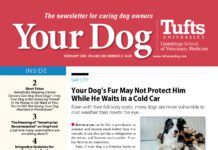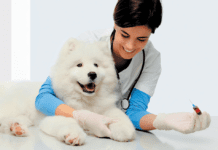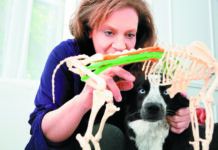Neighbor threatens to shoot aggressive dog
Q: My black Lab, about three years old, is very aggressive. While perfectly friendly once she knows you, she will nip strangers’ heels. But my bigger problem is that several times now, she has jumped on a smaller terrier who lives next door, actually biting that dog badly enough that it had to be taken to the vet to clean its wounds and perhaps get stitches. The last time it happened, my neighbor had the gun out and demands that I get rid of my dog or he will kill her. Unfortunately, I have never been around when all this happens. I should note that my dog is afraid of thunder and firecrackers and that this is the only dog she has ever bothered. I am in my 80s and live alone. I do not want to lose my pet. If you could help with suggestions, it would be very much appreciated.
Download The Full February 2024 Issue PDF
- Your Dog’s Fur May Not Protect Him While He Waits in a Cold Car
- Short Takes
- The Meaning of “Veterinarian Recommended” on Dog Food
- Integrative Geriatrics for Your Senior Dog?
- Don’t Let Your Dog’s Light-Up Collar Flash On and Off
- What’s On Your Dog’s Favorite Playlist?
- Does Your Dog Suffer from Motion Sickness in the Car, or is it Anxiety?
- Dear Doctor
Your Dog’s Fur May Not Protect Him While He Waits in a Cold Car
Just as a car can be like a greenhouse in summer and become much hotter than it is outside, it can also act like a refrigerator in the winter and become much colder. A car has little to no insulation.
Genetically Mapping Canine Cancers Can Help Save Dogs’ Lives
In human medicine, genetic mapping of tumors that have already metastasized has added years to the lives of cancer patients who otherwise would have been near death. By understanding the exact nature of the genetic mutation that caused the cancer, scientists have been able to develop drugs that target malignant tumors with incredible precision, effectively pushing back the advance of life-threatening disease. Now, veterinary researchers have begun the process of pinning down the genomes of tumors in dogs.
Your Dog is Not Relieving Herself in the House to Get Back at You
If your potty-trained dog eliminates in your absence, it’s not to spite you or be vindictive about you leaving. It’s most likely because she feels panicked in your absence. In fact, that look on her face when you arrive back home is not remorse or guilt — it’s fear. She sees you’re angry at her and doesn’t understand why, since all she knows is that she has just been through an ordeal.
You’re Still Not Giving Your Dog Heartworm Preventives?
More than six out of 10 dogs participating in research known as the Golden Retriever Lifetime Study had not previously been on heartworm preventives, according to research funded by the Morris Animal Foundation. While the investigation was just on one breed, it’s safe to assume this alarming statistic applies to other breeds (and mixed breeds) as well.
The Meaning of “Veterinarian Recommended” on Dog Food
You know those television commercials that have a dentist in a lab coat recommending a particular toothpaste? Well, the marketing ploy has drifted over to products meant for our pets, in a manner of speaking. A number of dog food manufacturers have a burst in large letters on the front of their packages that says the product is “Veterinarian Recommended.”
Integrative Geriatrics for Your Senior Dog?
“I always wanted to be a veterinarian,” Dr. Narda Robinson says, “but it just seemed like too much of a heartbreak.” So she went to medical school, practiced on people for a few years, then finally accepted that “what I really needed to do with my life was work with animals,” she remarks.
Does Your Dog Suffer from Motion Sickness in the Car, or is it Anxiety?
The image of a dog sticking his head out the car window is iconic. Even though it’s unsafe because it means he’s not safely secured in his seat, most dogs love to feel the wind on their face as the vehicle rushes along. Yet a small but significant minority of dogs feel nauseated during car rides, literally. They hunker down for what’s going to be a grim experience. They whine, pace, or smack their lips. Some drool or vomit.
Dear Doctor February 2024
Walk the dog before or after meals?
Don’t Let Your Dog’s Light-Up Collar Flash On and Off
Especially during these short days of the year, light-up collars and leashes are great for taking your dog for that last piddle in the dark. But you may want to leave off the flash option so the bulbs don’t keep blinking. Flashing lights can bring on epileptic attacks in some people. And they may irritate some dogs, or worse, make them feel anxious or unnerved. Best to light up your dog’s night life with a steady glow.
What’s On Your Dog’s Favorite Playlist?
An easy and surefire way to calm a dog who’s anxious, perhaps because you’re not home, is to leave on some music. A number of studies suggest that dogs find music calming. But not just any music.
















